https://github.com/henrygd/queue
Tiny async queue with concurrency control. Like p-limit or fastq, but smaller and faster.
https://github.com/henrygd/queue
async async-await asynchronous concurrency promise queue
Last synced: 10 months ago
JSON representation
Tiny async queue with concurrency control. Like p-limit or fastq, but smaller and faster.
- Host: GitHub
- URL: https://github.com/henrygd/queue
- Owner: henrygd
- License: mit
- Created: 2024-06-09T21:41:22.000Z (over 1 year ago)
- Default Branch: main
- Last Pushed: 2024-11-19T16:36:52.000Z (about 1 year ago)
- Last Synced: 2025-03-28T16:07:25.712Z (10 months ago)
- Topics: async, async-await, asynchronous, concurrency, promise, queue
- Language: TypeScript
- Homepage:
- Size: 71.3 KB
- Stars: 92
- Watchers: 2
- Forks: 2
- Open Issues: 0
-
Metadata Files:
- Readme: readme.md
- License: LICENSE
Awesome Lists containing this project
README
[size-image]: https://img.shields.io/github/size/henrygd/queue/dist/index.min.js?style=flat
[license-image]: https://img.shields.io/github/license/henrygd/queue?style=flat&color=%2349ac0c
[license-url]: /LICENSE
# @henrygd/queue
[![File Size][size-image]](https://github.com/henrygd/queue/blob/main/dist/index.min.js) [![MIT license][license-image]][license-url] [](https://jsr.io/@henrygd/queue)
Tiny async queue with concurrency control. Like `p-limit` or `fastq`, but smaller and faster. See [comparisons and benchmarks](#comparisons-and-benchmarks) below.
Works with: 




## Usage
Create a queue with the `newQueue` function. Then add async functions - or promise returning functions - to your queue with the `add` method.
You can use `queue.done()` to wait for the queue to be empty.
```ts
import { newQueue } from '@henrygd/queue'
// create a new queue with a concurrency of 2
const queue = newQueue(2)
const pokemon = ['ditto', 'hitmonlee', 'pidgeot', 'poliwhirl', 'golem', 'charizard']
for (const name of pokemon) {
queue.add(async () => {
const res = await fetch(`https://pokeapi.co/api/v2/pokemon/${name}`)
const json = await res.json()
console.log(`${json.name}: ${json.height * 10}cm | ${json.weight / 10}kg`)
})
}
console.log('running')
await queue.done()
console.log('done')
```
The return value of `queue.add` is the same as the return value of the supplied function.
```ts
const response = await queue.add(() => fetch('https://pokeapi.co/api/v2/pokemon'))
console.log(response.ok, response.status, response.headers)
```
> [!TIP]
> If you need support for Node's [AsyncLocalStorage](https://nodejs.org/api/async_context.html#introduction), import `@henrygd/queue/async-storage` instead.
## Queue interface
```ts
/** Add an async function / promise wrapper to the queue */
queue.add(promiseFunction: () => PromiseLike): Promise
/** Returns a promise that resolves when the queue is empty */
queue.done(): Promise
/** Empties the queue (active promises are not cancelled) */
queue.clear(): void
/** Returns the number of promises currently running */
queue.active(): number
/** Returns the total number of promises in the queue */
queue.size(): number
```
## Comparisons and benchmarks
| Library | Version | Bundle size (B) | Weekly downloads |
| :-------------------------------------------------------------- | :------ | :-------------- | :--------------- |
| @henrygd/queue | 1.0.6 | 355 | dozens :) |
| [p-limit](https://github.com/sindresorhus/p-limit) | 5.0.0 | 1,763 | 118,953,973 |
| [async.queue](https://github.com/caolan/async) | 3.2.5 | 6,873 | 53,645,627 |
| [fastq](https://github.com/mcollina/fastq) | 1.17.1 | 3,050 | 39,257,355 |
| [queue](https://github.com/jessetane/queue) | 7.0.0 | 2,840 | 4,259,101 |
| [promise-queue](https://github.com/promise-queue/promise-queue) | 2.2.5 | 2,200 | 1,092,431 |
### Note on benchmarks
All libraries run the exact same test. Each operation measures how quickly the queue can resolve 1,000 async functions. The function just increments a counter and checks if it has reached 1,000.[^benchmark]
We check for completion inside the function so that `promise-queue` and `p-limit` are not penalized by having to use `Promise.all` (they don't provide a promise that resolves when the queue is empty).
## Browser benchmark
This test was run in Chromium. Chrome and Edge are the same. Firefox and Safari are slower and closer, with `@henrygd/queue` just edging out `promise-queue`. I think both are hitting the upper limit of what those browsers will allow.
You can run or tweak for yourself here: https://jsbm.dev/TKyOdie0sbpOh
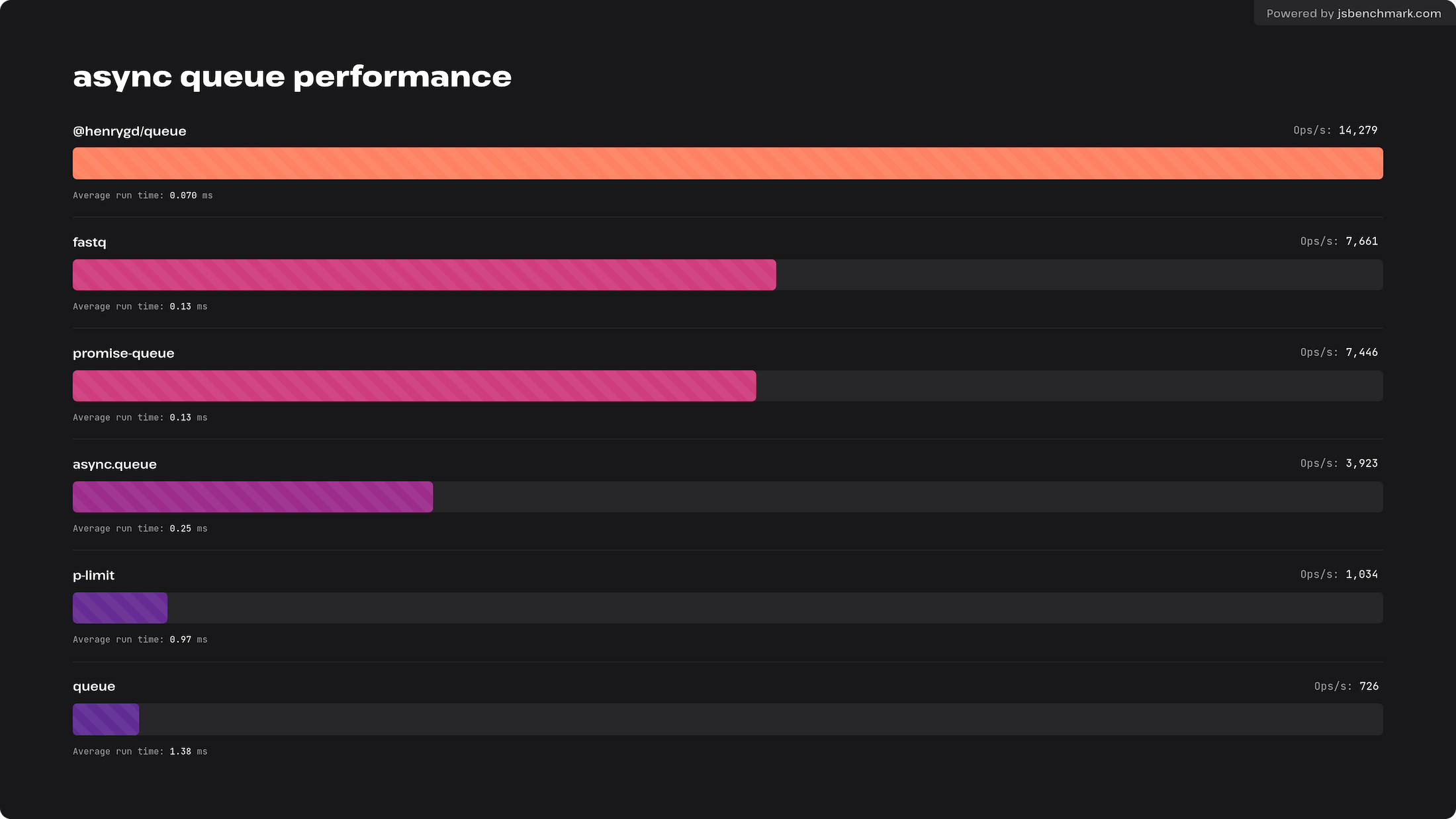
## Node.js benchmarks
> Note: `p-limit` 6.1.0 now places between `async.queue` and `queue` in Node and Deno.
Ryzen 5 4500U | 8GB RAM | Node 22.3.0
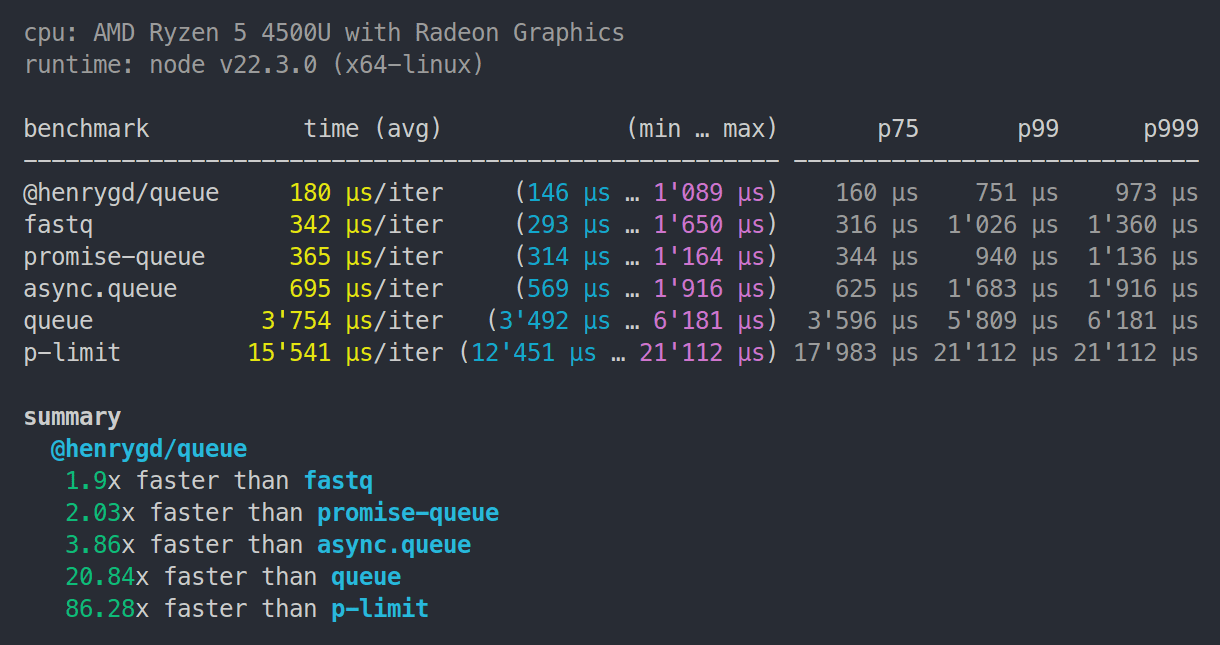
Ryzen 7 6800H | 32GB RAM | Node 22.3.0
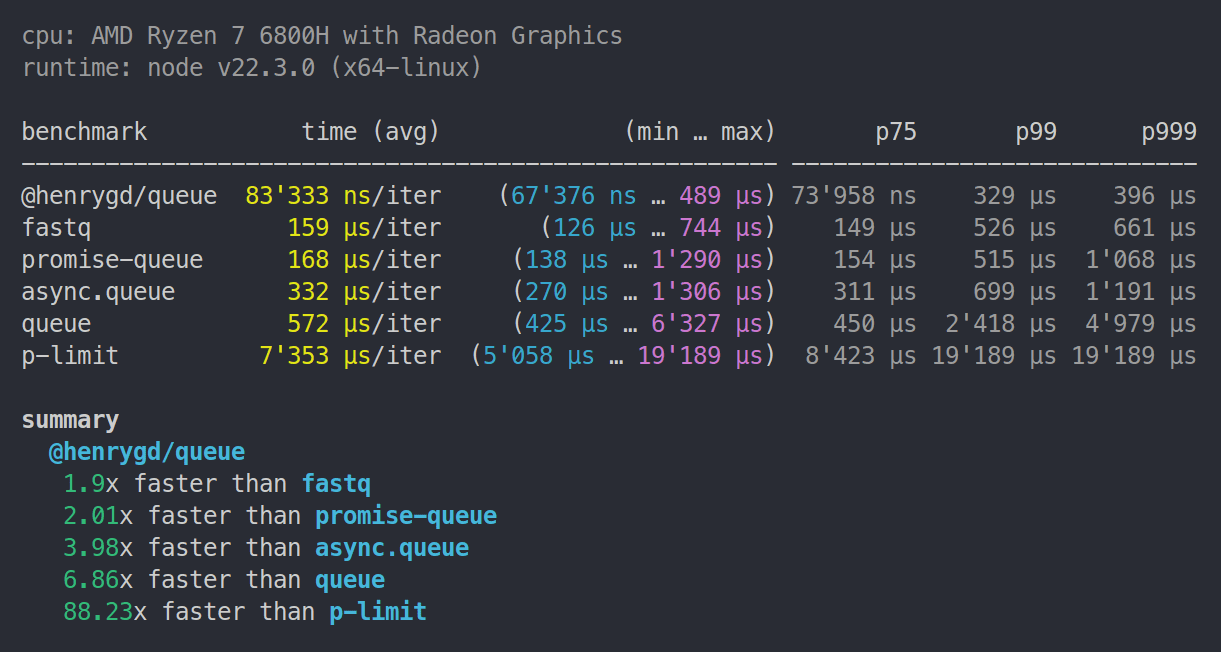
## Deno benchmarks
> Note: `p-limit` 6.1.0 now places between `async.queue` and `queue` in Node and Deno.
Ryzen 5 4500U | 8GB RAM | Deno 1.44.4
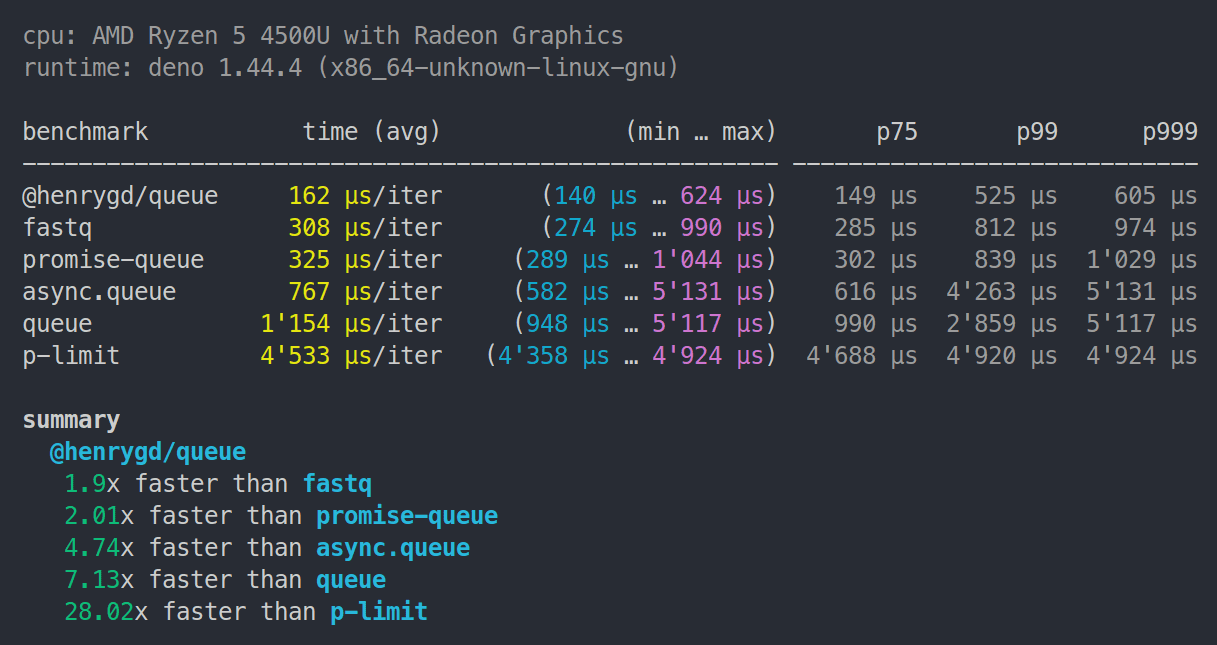
Ryzen 7 6800H | 32GB RAM | Deno 1.44.4
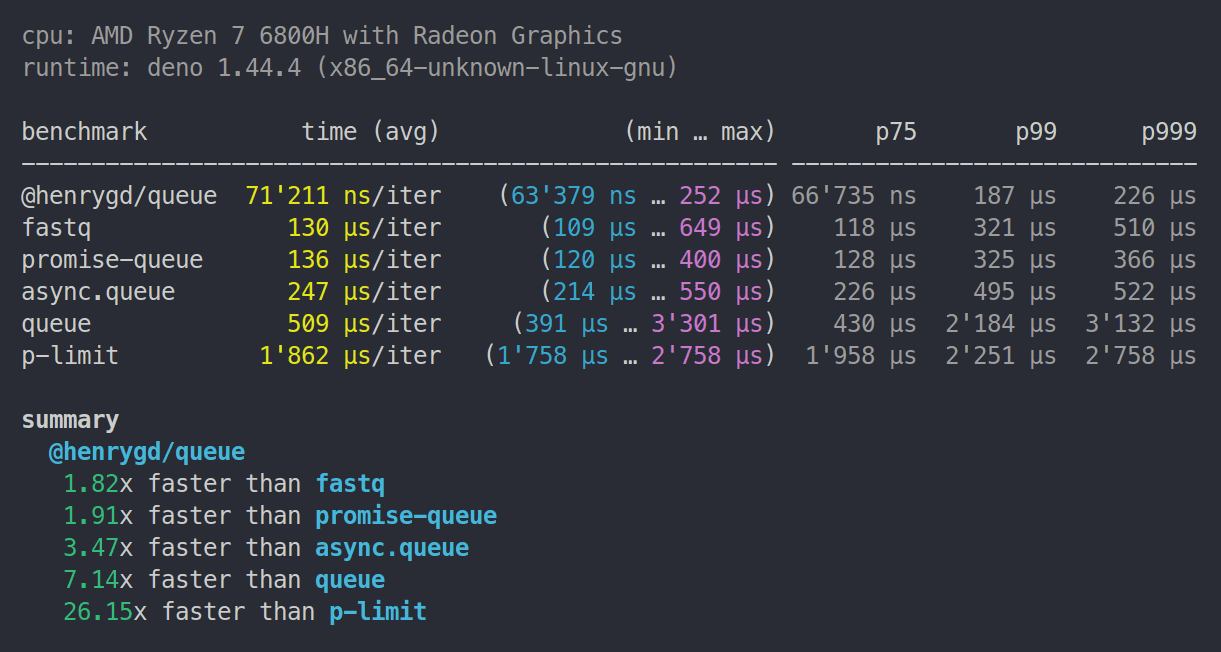
## Bun benchmarks
Ryzen 5 4500U | 8GB RAM | Bun 1.1.17
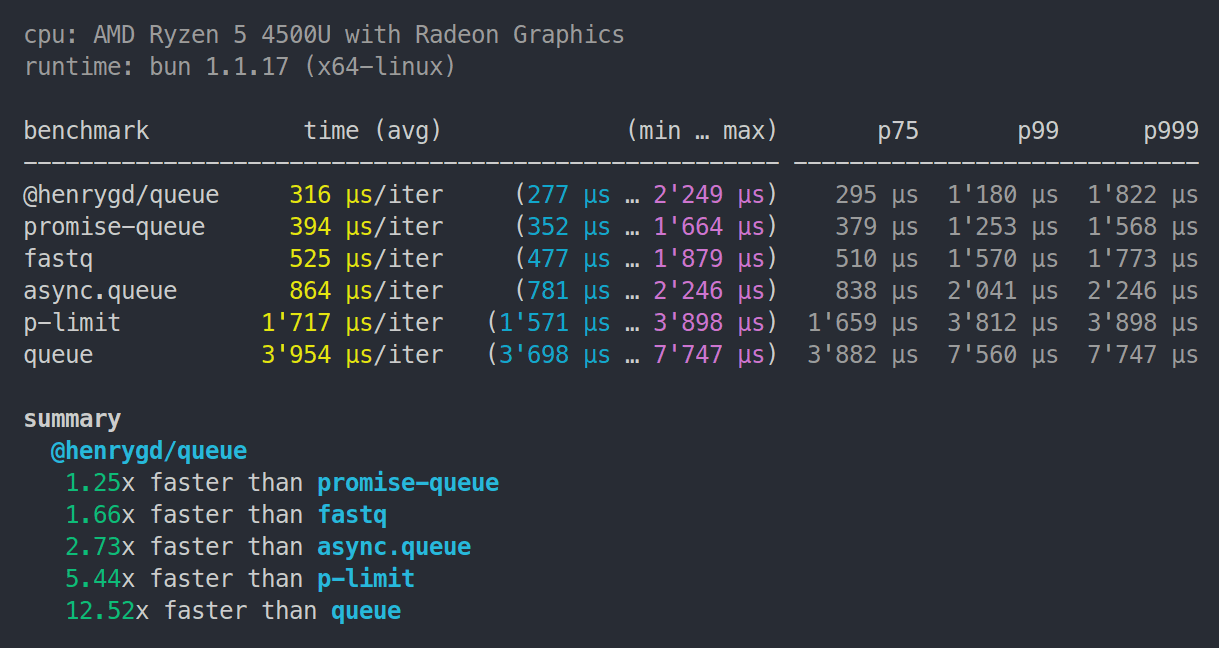
Ryzen 7 6800H | 32GB RAM | Bun 1.1.17
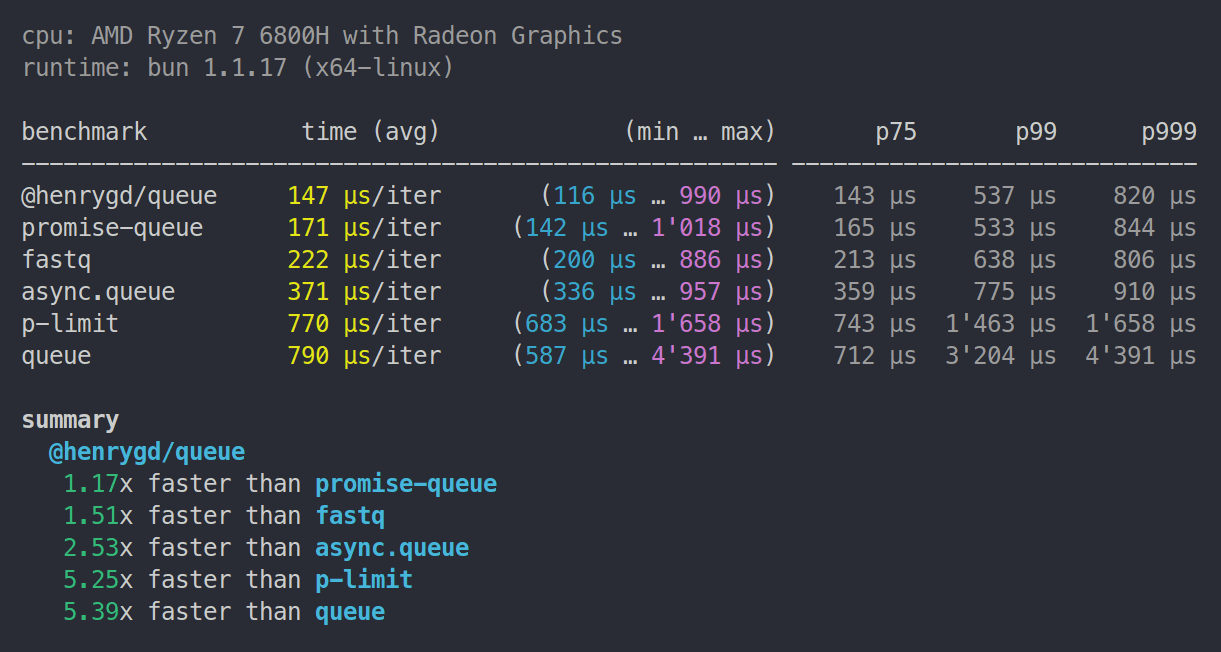
## Cloudflare Workers benchmark
Uses [oha](https://github.com/hatoo/oha) to make 1,000 requests to each worker. Each request creates a queue and resolves 5,000 functions.
This was run locally using [Wrangler](https://developers.cloudflare.com/workers/get-started/guide/) on a Ryzen 7 6800H laptop. Wrangler uses the same [workerd](https://github.com/cloudflare/workerd) runtime as workers deployed to Cloudflare, so the relative difference should be accurate. Here's the [repository for this benchmark](https://github.com/henrygd/async-queue-wrangler-benchmark).
| Library | Requests/sec | Total (sec) | Average | Slowest |
| :------------- | :----------- | :---------- | :------ | :------ |
| @henrygd/queue | 816.1074 | 1.2253 | 0.0602 | 0.0864 |
| promise-queue | 647.2809 | 1.5449 | 0.0759 | 0.1149 |
| fastq | 336.7031 | 3.0877 | 0.1459 | 0.2080 |
| async.queue | 198.9986 | 5.0252 | 0.2468 | 0.3544 |
| queue | 85.6483 | 11.6757 | 0.5732 | 0.7629 |
| p-limit | 77.7434 | 12.8628 | 0.6316 | 0.9585 |
## Related
[`@henrygd/semaphore`](https://github.com/henrygd/semaphore) - Fastest javascript inline semaphores and mutexes using async / await.
## License
[MIT license](/LICENSE)
[^benchmark]: In reality, you may not be running so many jobs at once, and your jobs will take much longer to resolve. So performance will depend more on the jobs themselves.